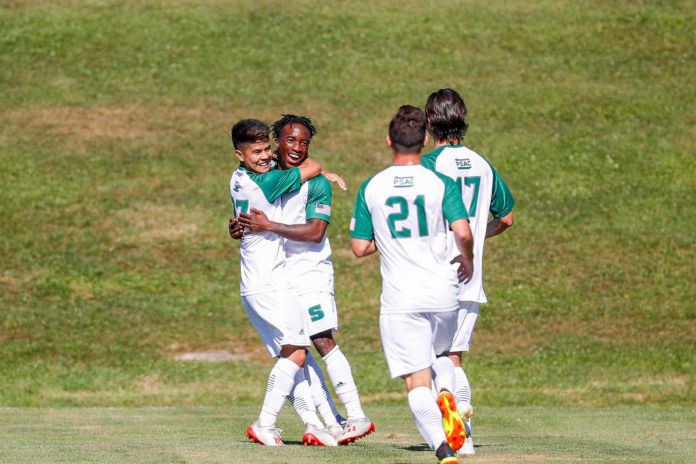Out to eventually prove last year’s postseason berth was no coincidence, rather the showcasing of a new standard, Slippery Rock University men’s soccer head coach Kevin Wilhelm and his squad have been acclimating to unfavorable conditions.
Due to obligations such as apartments and the inability to switch flights, international players from as far as Australia and Poland began returning to the U.S. as early as July 27. One player in particular, Brazilian midfielder Ale Okuma, a would-be senior, is unable to return to the country due to a travel ban and will re-enroll in January.
Not unlike most others, junior defender Dan Schearer, a team captain, did not at first think that the repercussions of COVID-19 on schooling and sports would last long.
“Still, right now, everything is kind of up in the air because you don’t know how the virus is going to go with people going back to classes,” said Schearer, a 2019 first-team All-PSAC Western Division honoree who has appeared in 35 games in his Slippery Rock career. “But, everybody involved has been communicating to their best ability, and I think the NCAA’s best interest is the athletes being able to play safely and to keep everybody healthy.”
Players spent the summer keeping up with workout programs that Wilhelm sent. Not much has changed since the players arrived back in Slippery Rock, under the ruling that all workouts and meetings are strictly voluntary.
“That basically means that, as a coach, you can’t really supervise anything […] or give any instruction,” Wilhelm said. “We’re also limited, even down on the field, just one-on-one individual training, so there’s nothing we can do as a group that the university’s permitting us to do.”
The team’s first lifting session in months took place on Monday, Schearer said. He estimated that only 15 players are permitted in a group, as long as everyone is wearing masks and equipment remains sanitized.
“We do a morning check-in to see how we’re feeling and get our temperature checked,” Schearer said. “I appreciate the effort that the athletic trainers and the athletic director and the president are putting in to keep us safe, because that’s what is mostly important, obviously. Everybody wants to get on the field and kick a ball around and be competitive, but right now we need to focus on keeping each other safe and just being patient.”
Loss of a preseason, a time in which Wilhelm said a lot of the work is done for the current year and a great deal of evaluation is done as well, has set back planning for future seasons. With nine additions to the roster, he and his staff are unable to judge how the fledgling players mesh with the returners.
“Since May […], when the NCAA put the kibosh on recruiting [by coming out] and saying this is going to be a quiet period,” Wilhelm said. “They extended that until September, so we haven’t been able to go to any events, travel to any tournaments, anything like that, to go see kids perform live.”
Also not permitted are the school’s summer and fall ID clinics, which allow Wilhelm to bring in prospective student-athletes and evaluate their skills firsthand.
Though he admits he can not be overconfident, Wilhelm said that, on paper, this year’s class of rookie players appears to be even better than the last. Schearer, having had the experience of playing alongside scorers like Alejandro Fernandez and Ramses Minaya, agrees.
“The recruiting class he brought in [last season] was just stellar,” Schearer said. “From what I’ve seen kicking the ball around with a couple of guys or seeing film, he did it again.”
As far as an office standpoint, Wilhelm said, a ton of time was spent on doing things that never came to fruition. After the PSAC tentatively whittled teams’ schedules down to 14 games for the season, Wilhelm scoured for four non-conference opponents to fill the calendar. When it was announced that playing fields would be barren this fall, he passed the time composing a team training program that was deemed useless in the first week of August.
“Each time one of these big changes happen,” Wilhelm said. “The domino effect is hours upon hours of recalculating.”
If the season is to take place this year, Wilhelm said he has heard from the NCAA that, as long as a team does not play more than 50% of its normal schedule, players will not lose a season of eligibility. As such a decision would not count scrimmages or postseason play, there has also been talk of expanding the conference’s playoff tournament to sneak some extra games.
“It probably helps the [underclassmen] out significantly,” Wilhelm said. “For the guys that are set to graduate here coming up in May, it’s probably too late for them to change anything and it probably doesn’t make much economic sense for them either to be a full-pace student just to stay around one more semester to play a sport.”
As for what players do in their free time, the head coach will not meddle. However, the team has been told that the university’s COVID-19 policies have become part of team rules.
“If it’s against the university policy, then it’s against our team rules and will be enforced as a team rule,” Wilhelm said. “We reinforce the ideas that putting yourself in situations like that can be dangerous not only to you, but to the person standing next to you.”
From a player standpoint, Schearer made it known that he and other team leaders discourage anything that could end up further pushing back the season.
“Ultimately, we want to play,” Schearer said. “You don’t want to be the one contributing to reasons why we have to wait longer and longer and longer […] The self-discipline that goes into this fall is going to determine who wins the PSAC next spring.”









